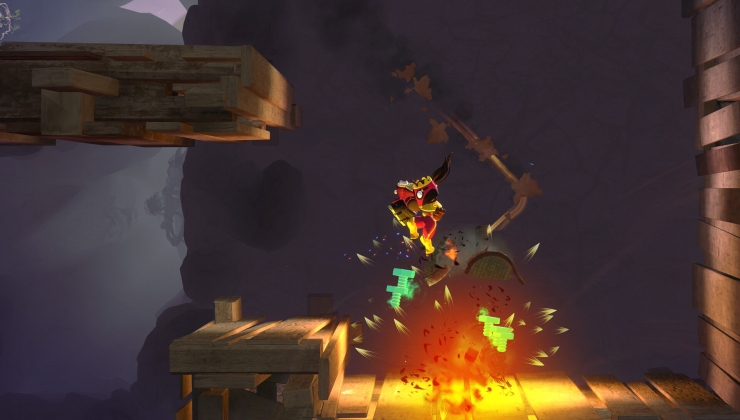If you were hoping at some point to see HDMI 2.1+ on Linux with AMD + Mesa, you're out of luck right now as it's simply not going to be happening.
There's been a bug report on the Mesa GitLab of "4k@120hz unavailable via HDMI 2.1" that's been open for a few years now, with lots of comments and chatter about the issue. The problem is that HDMI is a proprietary interface, whereas DisplayPort is run by the international non-profit VESA, so it's much more complicated for HDMI support.
In an update on the bug report, AMD engineer Alex Deucher commented: "The HDMI Forum has rejected our proposal unfortunately. At this time an open source HDMI 2.1 implementation is not possible without running afoul of the HDMI Forum requirements."
So if you're on Linux, it's going to continue to be best to buy hardware that uses DisplayPort.
On the NVIDIA side though, it seems like it may not be an issue, as developer Karol Herbst wrote on Mastodon: "Even though AMD might not be able to add support for HDMI 2.1, nouveau certainly will as Nvidia's open source driver _also_ supports HDMI 2.1 so there is no reason to believe that at least some drivers can't support HDMI 2.1
It's quite backwards, but apparently having all the logic inside firmware (like Nvidia does) will probably help us implementing support for HDMI 2.1"
So perhaps in future AMD may be able to do something similar with their firmware.
So if you're on Linux, it's going to continue to be best to buy hardware that uses DisplayPort.I found that to be true regardless of Linux or AMD.
At least in my experience, I never had issues with DisplayPort, but definitely quite a few across platforms with HDMI.
Frustating to experience. Fun to watch.
In the end it again boils down to the DMCA's weird treatment of copy-protection.
If I had the money I would be looking at taking legal action. I am now 3k out of pocket thanks to the HDMI forum.
I use my TV for UHD4k Bluray and Gaming Consoles and all these require HDMI. This is why I chose HDMI for PC also. But now I am forced to buy a new display that used Display Port if I want to use all the HDMI 2.1 features I have already paid for.
I really wish HDMI would just Die. Sick of jumping through hoops.
Last edited by finaldest on 29 Feb 2024 at 3:19 pm UTC
So I have a fantastic 55 inch gaming capable TV which I paid over £2k for so I could have all the HDMI 2.1 features and £1k for a HDMI 2.1 capable GFX card but the HDMI forum wont allow me to use said hardware because they refuse to allow AMD to release drivers.
If I had the money I would be looking at taking legal action. I am now 3k out of pocket thanks to the HDMI forum.
I use my TV for UHD4k Bluray and Gaming Consoles and all these require HDMI. This is why I chose HDMI for PC also. But now I am forced to buy a new display that used Display Port if I want to use all the HDMI 2.1 features I have already paid for.
I really wish HDMI would just Die. Sick of jumping through hoops.
I think, and may be wrong, that this only applies to the open source AMD stack, the closed source driver may not be subject to this limitation.
this only applies to the open source AMD stack, the closed source driver may not be subject to this limitation.
Sure, but who wants to use the AMD closed source drivers? ATI/AMD has never been good at graphics drivers (on any OS).
I think, and may be wrong, that this only applies to the open source AMD stack, the closed source driver may not be subject to this limitation.It does, unfortunately. Both mesa (gpu open drivers including amd's) and AMDGPU-PRO (amd's proprietary drivers) rely on the open source AMDGPU (part of the linux kernel), and this implementation was part of the kernel driver (and can't be anywhere but the kernel). So the HDMI forum rejecting this basically closed off hdmi 2.1 on amd for at least the existing gpus. It may yet be possible for next gpus to support hdmi 2.1 on linux by relying on a firmware level driver (like nvidia does) or on an internal chip that converts displayport signal to hdmi signal (like intel does).
So I have a fantastic 55 inch gaming capable TV which I paid over £2k for so I could have all the HDMI 2.1 features and £1k for a HDMI 2.1 capable GFX card but the HDMI forum wont allow me to use said hardware because they refuse to allow AMD to release drivers.
If I had the money I would be looking at taking legal action. I am now 3k out of pocket thanks to the HDMI forum.
I use my TV for UHD4k Bluray and Gaming Consoles and all these require HDMI. This is why I chose HDMI for PC also. But now I am forced to buy a new display that used Display Port if I want to use all the HDMI 2.1 features I have already paid for.
I really wish HDMI would just Die. Sick of jumping through hoops.
Save your money, you have no legal standing and your case would be thrown out of court.
Last edited by lejimster on 29 Feb 2024 at 11:28 pm UTC
Save your money, you have no legal standing and your case would be thrown out of court.There could possibly be a case against AMD however. I'm not in the legal field of studies, but AMD is advertising HDMI 2.1 on their RX 6000 and 7000 cards even on linux when that is not the case. So maybe...
For example, capture cards, all high end, all HDMI2.1, DisplayPort 2.0 doesn't exist. Hell its hard to find a decent priced DP2.0 cable even. So on one hand open-standard is best, on the other, open-standard sucks when few support it! (for devices etc)
Like it or not, HDMI2.1 has massive backing and support. Corporations win! sadly...
Last edited by TheRiddick on 1 Mar 2024 at 4:20 am UTC
"no signal"? black screen? or does this setup fallback to an hdmi 2.0 featureset and i'm just limited some feature or another?
what does hdmi 2.1 do that hdmi 2.0 doesn't?
Last edited by Marlock on 1 Mar 2024 at 10:11 am UTC
what does hdmi 2.1 do that hdmi 2.0 doesn't?
For the most part HDMI2.1 is 48Gbps bandwidth so can support higher hz with HDR and all that.
However HDMI2.0 with DSC can hit 4k 120hz 10bit just fine I believe.
When I had my 7900XTX, wayland was happy setting 4k 120hz and according to display data it was 10bit, so maybe also work with HDR?
what happens if i get an amd gpu that supports hdmi 2.1, an hdmi 2.1 cable, and an hdmi 2.1 monitor and plug them together, then boot up linux?The higher bandwidth (18 vs 48Gbps), VRR (hdmi2.0 doesn't support ver, tho Nvidia and and have working code on windows to somehow support it in a hacky way, only for windows though) and DSC for going beyond the supposed limit of the bandwidth. If you use hdmi2.1 without the proper driver you'll be limited to sorta hdmi2.0 feature set.
"no signal"? black screen? or does this setup fallback to an hdmi 2.0 featureset and i'm just limited some feature or another?
what does hdmi 2.1 do that hdmi 2.0 doesn't?
This is very strange, DSC was implemented as part of the HDMI 2.1 spec, and the only way to get to 4k@120Hz with HDMI 2.0 is through 8-bit bit and subsampling to 4:2:0, instead of the full 4:4:4. Are you sure you're getting 10-bit and 4:4:4 subsampling?what does hdmi 2.1 do that hdmi 2.0 doesn't?
For the most part HDMI2.1 is 48Gbps bandwidth so can support higher hz with HDR and all that.
However HDMI2.0 with DSC can hit 4k 120hz 10bit just fine I believe.
When I had my 7900XTX, wayland was happy setting 4k 120hz and according to display data it was 10bit, so maybe also work with HDR?
Are you sure you're getting 10-bit and 4:4:4 subsampling?
I don't have the card. I just checked under WAYLAND when I did and the display information app which I've forgotten the name of, said 10-bit colorspace!
Last edited by TheRiddick on 1 Mar 2024 at 11:02 am UTC
me reads the only explanation from the article
There's been a bug report on the Mesa GitLab of "4k@120hz unavailable via HDMI 2.1" that's been open for a few years now, with lots of comments and chatter about the issue. The problem is that HDMI is a proprietary interface, whereas DisplayPort is run by the international non-profit VESA, so it's much more complicated for HDMI support.
Well at least the community plays safe














 How to set, change and reset your SteamOS / Steam Deck desktop sudo password
How to set, change and reset your SteamOS / Steam Deck desktop sudo password How to set up Decky Loader on Steam Deck / SteamOS for easy plugins
How to set up Decky Loader on Steam Deck / SteamOS for easy plugins
See more from me